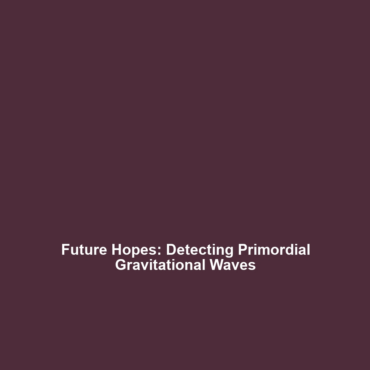Future Hopes for Detecting Primordial Gravitational Waves from the Early Universe
Introduction
Understanding the future hopes for detecting primordial gravitational waves is vital to unraveling the mysteries of the early universe. Gravitational waves, ripples in spacetime caused by massive cosmic events, provide us a unique insight into the workings of the cosmos. Researchers anticipate that detecting these primordial waves—generated within the first fractions of a second after the Big Bang—could reveal information about the universe’s evolution, its structure, and its fundamental physics. This article delves into the significance of these future endeavors within the broader context of gravitational waves.
Key Concepts
The field of gravitational waves is anchored in several key concepts:
What are Primordial Gravitational Waves?
Primordial gravitational waves are theoretical fluctuations that occurred during the inflationary epoch of the universe—a rapid expansion that happened right after the Big Bang. These waves carry information about the energy scales of inflation and can help scientists understand the very early universe’s conditions.
Detection Methods
Various methods, including the use of highly sensitive observatories like LIGO and future missions like the Laser Interferometer Space Antenna (LISA), are potential strategies for detecting these gravitational waves. The hope is to observe their imprint on the Cosmic Microwave Background (CMB), which is the afterglow of the Big Bang.
Applications and Real-World Uses
Detecting primordial gravitational waves holds several significant applications:
- Cosmology Research: How detecting primordial gravitational waves is used in cosmology could redefine our understanding of the universe’s birth and expansion.
- Physics of Inflation: Applications of primordial gravitational waves in understanding the physics of inflation could bridge gaps in both theoretical and experimental physics.
- Testing General Relativity: Investigating these waves offers a way to challenge conventional wisdom and validate Einstein’s theory in extreme conditions.
Current Challenges
While the prospects are promising, several challenges remain in studying primordial gravitational waves:
- Detection Sensitivity: Current gravitational wave detectors are not sensitive enough to identify the faint signals of primordial waves.
- Noise Interference: Background noise from various astrophysical sources can obscure weak gravitational wave signals.
- Theoretical Uncertainties: Our understanding of inflation and associated physics remains incomplete, posing challenges in modeling and predicting waveforms.
Future Research and Innovations
Looking ahead, significant innovations in gravitational wave research are on the horizon:
- Next-Generation Detectors: Projects like the Deci-Hertz Interferometer Gravitational-wave Observatory (DECIGO) aim to enhance detection capabilities for low-frequency gravitational waves.
- Space-Based Observatories: The upcoming space-based gravitational wave observatories promise to provide increased sensitivity, facilitating the detection of primordial gravitational waves.
- Improved Data Analysis Techniques: Advances in machine learning and data processing techniques will aid in extracting signals from noisy astronomical data.
Conclusion
In summary, the future hopes for detecting primordial gravitational waves from the early universe could significantly enhance our understanding of cosmology and astrophysics. As researchers strive to address current challenges and embrace innovative technologies, the prospect of uncovering the secrets of the cosmos remains enticing. Researchers and enthusiasts are encouraged to stay updated and engaged with the latest developments in gravitational waves research.
For more information, consider reading about the latest advancements in gravitational wave astronomy or exploring the mechanics of the universe through other astrophysical phenomena.
